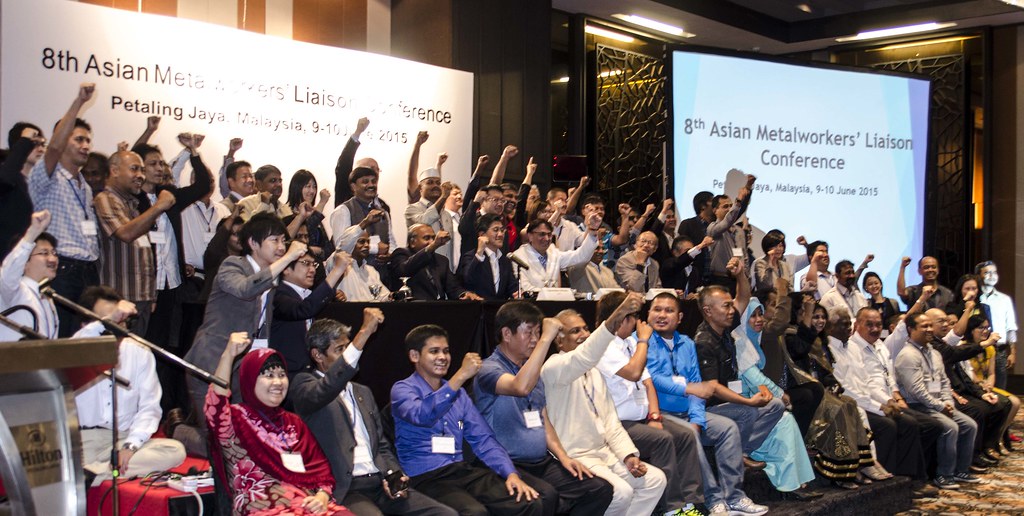3 February, 2015About 80 members from 15 countries across the Asia Pacific Region met at the 8th Asian Metalworkers Liaison Conference (AMLC) in Petaling Jaya, Malaysia to discuss workers issues in the metal industry in Asia.
After extensive discussions, it was decided that the JCM sponsored Asian Metalworkers Liaison Conference (AMLC) will be held in the summer of 2016, before the IndustriALL Congress in October the same year. Going forward from 2017, possibilities for the meeting format will be explored.
The AMLC has been supplementing IndustriALL activities in the Asian region. Now there is a need for activities to be streamlined to maximize the synergy achieved so far. The long history of the AMLC in its various phases has helped metalworkers unions in the region.
Union structures should be open. Unity between unions, like the unity achieved in Thailand, is important for viability of unions. Solidarity with the strike in India on 9 September and with the Korean workers, if they vote to go strike, was expressed, and the importance of the anti asbestos campaign was reiterated.
After the welcome from the president of the Japan Council of Metalworkers Unions, Yasunobu Aihara and Mohammad Hamdan bin Dorhalim as the representative of the Malaysian affiliates of IndustriALL Global Union, there were presentations from Kemal Ozkan, assistant general secretary of IndustriALL and the regional secretaries of IndustriALL in South Asia and Southeast Asia on the Action plan of IndustriALL and the activities in the Region.
Following the presentations there discussions on negotiating with multinational companies (MNCs), union building, precarious work and Global Framework Agreements. A need for trainings was expressed in order to better understand `the concept of sustainable industrial policy, as well as a need for an emergency fund when companies and government attack trade unions.
Country reports on the current situation of the metal industry and metalworkers’ unions from Japan, Philippines, India, Australia and Malaysia were presented. The common issues that were addressed by the presentations and the discussion following the presentations were increasing instances of precarious work in the metal industry and the anti union attitude of the government, which has impacted trade unions negatively.
Members from South Korea, Indonesia, Singapore, Sri Lanka and Thailand spoke on the issue of precarious work in their countries, and the measures taken by trade unions to battle it. TEAM from Thailand are establishing a Training Centre for precarious workers, which could be completed in August of this year. The issues and objectives - to limit long term use of precarious workers, obtaining equal pay for equal work, and social insurance - in different countries are similar. In the discussions, it was clear that a common definition of ‘precarious work’ is needed, as well as common action across the region. The issues of migrant workers and precarious workers are becoming critical in the region. The importance of AMLC as an information sharing cooperation forum was reiterated.
Charles Santiago, member of the parliament of Malaysia spoke about the ASEAN Economic Community. He spoke about the need for an Agenda for a Social ASEAN, and the need of making workers’ rights a priority. Kemal Ozkan responded to the talk, stressing the importance of transparency of such economic arrangements and that workers rights must be recognized and protected. The discussion focused on Free Trade Agreements and their impact on workers` rights.










